Det sjunde inseglet (1957) Ignmar Bergman, Sweden
Faith is a torment.
Many believe that The Seventh Seal is an allegory for the Holocaust. It is no secret that a young Bergman was a supporter of Hitler that he later deeply regretted and several themes of repentance are present in his films but not quite as starkly and as profoundly as in his 1957 piece, The Seventh Seal. Heavily based in Christianity which some would argue thrived during the black death, Bergman look at the futile nature of grief and a man’s struggle for meaning.
Antonius Block (Max Von Sydow) and his squire Jöns (Gunner Björnstrand) are returning from the bloody crusades. For anyone slightly dusty on their history, the Crusades was ordered by Pope Urbane II between 1096 and 1291 in order to “unify” the eastern and western branches of Christianity and to drive out the Muslims and Jews of the Holy Land. Volunteers were gathered by promises of divine forgiveness and mass ascension to heaven at Jerusalem. It was all a ruse however for the Pope to become more powerful and it was the first “Holocaust” for the Jewish and Muslim people. However, this part is not looked at and we begin the story after and witness Antonius’ struggle post-murder and death in the name of God.
On the beach, we encounter Death (Begnt Ekerot), a monk standing eerily on the precipice of the everlasting ocean. Antonius, who has survived death many times before challenges Death to a game of chess, believing that the strategy that has kept him alive this far can grant him access to live here as well. It is vaguely successful as dead leaves and Antonius and Jöns make their leave for their castle. On the way, they run into traveling performers: Jof (Nils Poppe), Mia (Bibi Andersson), their infant son Mikael, and fellow actor Jonas Skat (Erik Strandmark). Jof proclaims to have had holy visions of Jesus and Mary but his unorthodox lifestyle makes him questionable in the eyes of others. Mia gently chides her husband but my personal belief is that this is done as a form of protection for her husband as there are still witches and heretics being burned. The motley crew reminds me of the acting troop in Rosencrantz and Gildernstern are Dead! A veiled analogy that we live many lives and die many times only to get up again. “Some actors die three or four times a night!”
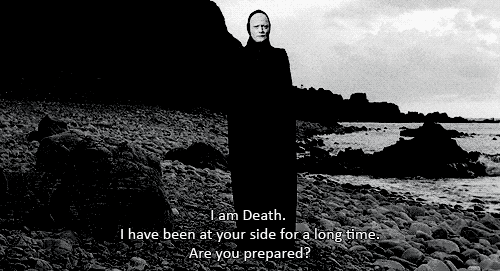
Inside of a church, Jöns sees a painting of the “Dance of Death”. Having returned from war physically okay but undoubtedly filled with the trauma he confronts the painter with anger. He accuses the painter of fanning the flames of the religious fervor which has spurred on the Holy Wars and has wreaked havoc over the lands where he has roamed. The painter has not seen such things but the black plague has ravaged their homeland in a different way. Could the plague be penance for Pope Urbane II’s bloodlust? If so, the people do not see the connection. Antonius’ faith is in crisis but he has not given to the nihilism of Jöns yet and goes to confession. Inside he tells the priest that his life has been meaningless although he has striven for meaning by joining the crusade. He let’s slip the chess strategy that will save him. The priest reveals himself as death and promises to remember the strategy. We cannot stop what is coming and often our attempts at control are often the seeds planted to our own demise.
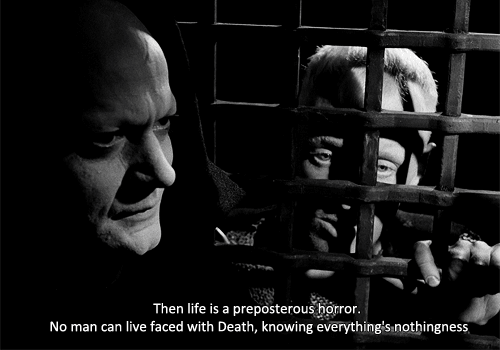
Outside of the church, Antonius sees a young woman about to be burned for witchcraft. Antonius asks her to summon the devil but she is lost in her own sorrow to perform for anyone else.
Later, Jöns searches a nearby town for water when he saves a young woman from being raped by a man who was pillaging a corpse. Jöns remembers the man as a theologian named Raval (Bertil Anderberg), who was the one who convinced Jöns to leave his home and wife in order to do the Lord’s work. The pain is palpable in this scene as we learn that we can be so easily misguided by others in positions of power who when the robes of fame are torn away we see their true characters. Jöns vows to mark the face of the theologian if they ever meet again. They take the servant girl with them who was either mute, to begin with or has become mute through trauma.
In the town, the new group meets the actors again. There is a show and laughter before flagellants come into town. They pass while singing and screaming as they self-mutilate themselves in the name of the lord. Any levity that had been created by Mia and Jons has left. Avoiding death may not be the answer, but surely depriving yourself of any pleasure is also the other sharp blade of a knife. Speaking of knives, Raval is seen manipulating others to bully Jof when he runs into Jöns who then keeps his promise and mutilates his face. Forgiveness and mercy have their place but so does justice in this world.

Despite the overwhelming sadness, there is hope and love. Mia serves the troop fresh strawberries and milk. In this small simple beauty, Antonius finds God. I was told by my teacher in my time of despair that happiness is never on the horizon but only in the present. He added that happiness comes in all sizes and the ability to recognize these sometimes small respites are still there and waiting to be recognized. Even as I write these words at my own time of despair I am reminded of a small simple pleasure that was given to me out of seemingly nowhere. I do believe that God works in mysterious ways and forces us to seize happiness even when there can be none found by normal means.
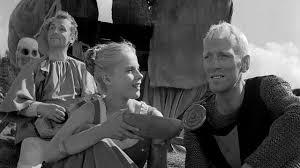
With his sign from God, Antonius welcomes the acting troop to his castle where he feels he might be able to give back his one deed before his own time passes. In the castle, they will be safe from the plague. "I’ll carry this memory between my hands as if it were a bowl filled to the brim with fresh milk…And it will be an adequate sign—it will be enough for me.“
There is a part here that I will not go into much detail but it pertains to suicide in order to hurt others. In a love triangle, the man pretends to commit suicide in order to hurt the woman that he loves. However, in my interpretation, suicide becomes a success. A warning here for those who play with the flame of life to snuff it out. I can imagine that on the other side, that one might be looking around rather stupidly at what they must have done. Time passes and the living continues to live while death is not undone.
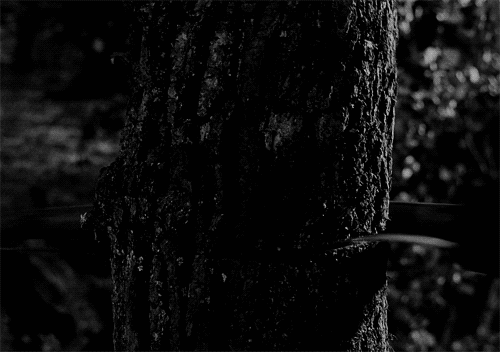
They pass the young woman who has been condemned to die. Antonius asks her to summon the Devil and she claims to have done so but Antonius cannot see the devil. All he can see is fear, which might be enough proof for me, but it was not for him. In the Tarot, The Devil card is almost the same as The Lover’s card. However, in The Devil, there are loose chains around the necks of Adam and Eve. These chains are loose enough for them to take off, yet they do not out of fear. Here Antonius performs his one meaningful task by giving her herbs that will take away her suffering. In the flames she sees something. She could not summon the devil but in her moment’s before passing she gives back to Antonius what he was originally looking for. Serving others is often the best and sometimes the only way to get the divinity we crave in an undivine world.
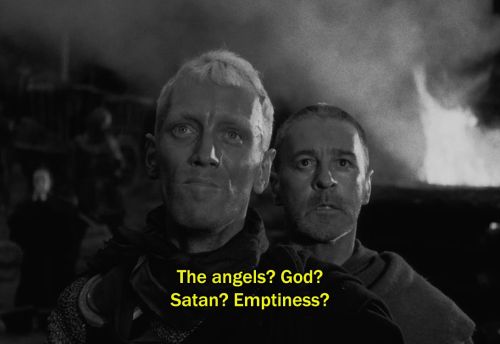
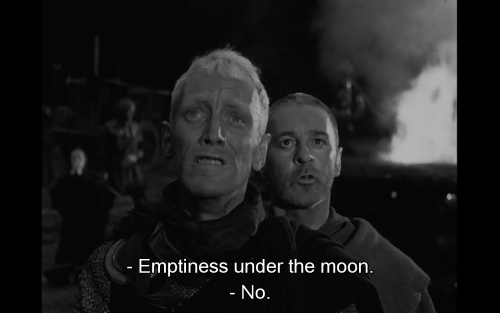
As I am learning, there are good and bad ways to die. How we leave this life and begin another is crucial. It feels as if it will take everything away from the person giving the care but perhaps it truly is the most meaningful gift you can give. There is a story about Jesus and the widow’s mite. Once a year the widows of Judea were given “Widow’s mites” the smallest silver coin worth about six minute’s of a man’s labor. Jesus sat across from the treasury and watched as those went to give. He watched many rich men deposit great sums of money but only stopped to bless a woman who gave all that she had. The treasury was corrupt and Jesus was against taking from the poor but was touched by her faith and how her faith was stronger than the rest. It is incredibly applicable to the story here, and the only reason why I tell it.
"Beware of the scribes, who like to go around in long robes and accept greetings in the marketplaces, seats of honor in synagogues, and places of honor at banquets. They devour the houses of widows and, as a pretext, recite lengthy prayers. They will receive a very severe condemnation.”
“And He looked up and saw the rich putting their gifts into the treasury, and He saw also a certain poor widow putting in two mites. So He said, “Truly I say to you that this poor widow has put in more than all; 4for all these out of their abundance have put in offerings for God, but she out of her poverty put in all the livelihood that she had.”
Grand gestures or climbing a ladder for power even religious power is dangerous and condemnable as we witnessed with the theologian that was mutilated. Antonius’ small offering of herbs to the witch was his salvation as he could have used those for himself in his own time of need to which he knew was approaching. Raval, the theologian, appears towards the end dying of the plague. Mia attempts to bring him water but is stopped. Raval dies alone and in pain without comfort.
As the chess game continues, Antonius confronts death in anger. Death reminds him that no one can escape. Jof, who earlier professed that he could see Mary and Joseph, can see Death. Antonius becomes aware and distracts death so that they may escape. Jof and Mia flee to safety. Another small but meaningful gesture is added to Antonius’ life.
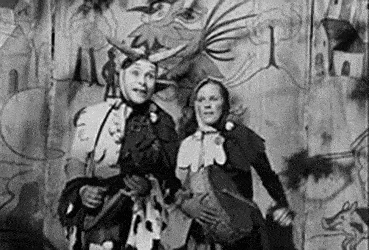
Death proclaimed that the next time they meet, it will be time to depart. Death, who has become almost a friend, inquires if Antonius has accomplished his mission. Antonius says that he has. As they part, there is a sense of completeness and unity.
Antonius is reunited with his wife who has taken care of the castle in his stead. In my personal interpretation, I believe that Death has transformed into the face of his lover (who has died of the plague already). The castle is empty and cold with no one around. The party then has a “last supper”. The mute girl speaks her only line, “It is finished” showing that there is freedom in death.
The next dawn the troop (minus Mia, Jof, and Mikael) are shown in a connected “Dance of Death” which is erratic as the wind, however, it is a dance nonetheless.
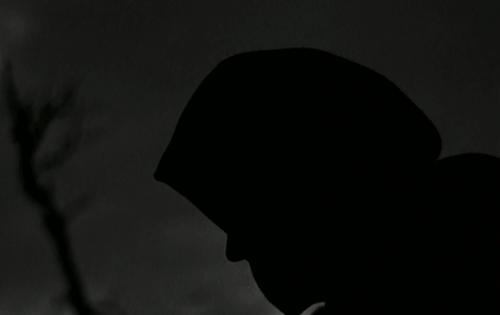

Comments